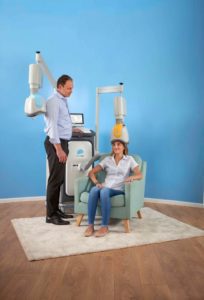
BrainsWay’s Deep Transcranial Magnetic Stimulation, or Deep TMS™, utilizes a noninvasive procedure to directly stimulate deeper brain structures found to be associated with mood disorders, such as depression or OCD.
During the Deep TMS procedure, a medical professional fits a cushioned helmet onto the patient’s head, making sure it is correctly aligned to stimulate the relevant brain structures. The helmet itself holds within it BrainsWay’s unique, patented H-coil technology, designed to directly stimulate deeper and broader regions of the brain. This is beneficial, as direct, deep brain stimulation of relevant brain structures has been shown to have longer lasting, positive effects on patients’ mood and well-being. The coil design itself includes a flexible base that can be adjusted to fit over different head shapes and sizes.
After the patient is fitted with BrainsWay’s helmet and the Deep TMS machine is turned on, the H-coil will begin sending magnetic pulses to activate and regulate the neural activity of the different brain regions it aims to reach. To the patient, this will sound and feel somewhat like repetitive tapping coming from within the helmet. As the procedure itself is noninvasive, most patients do not experience any significant side effects or discomfort, with a minority of patients reporting a passing headache following treatment.
Uniquely for the OCD treatment, prior to activating the magnetic field, patients will also be administered a script personalized to their obsessions and compulsions, designed to activate the relevant part of the brain for treatment. This is essentially an abbreviated version of Exposure & Response Prevention (ERP) that patients may be familiar with via their psychotherapist.
BrainsWay’s Deep TMS sessions are approximately 20 minutes long, as opposed to 40-minute standard TMS sessions. A treatment plan usually requires daily sessions over a four- to five-week period, followed by periodic maintenance sessions. Deep TMS treatment is available in outpatient facilities and can be incorporated into a patient’s daily schedule.
With proven results in alleviating mental illness symptoms, shorter session times and little to no side effects, it is clear why Deep TMS is quickly gaining recognition within the medical and mental health communities.